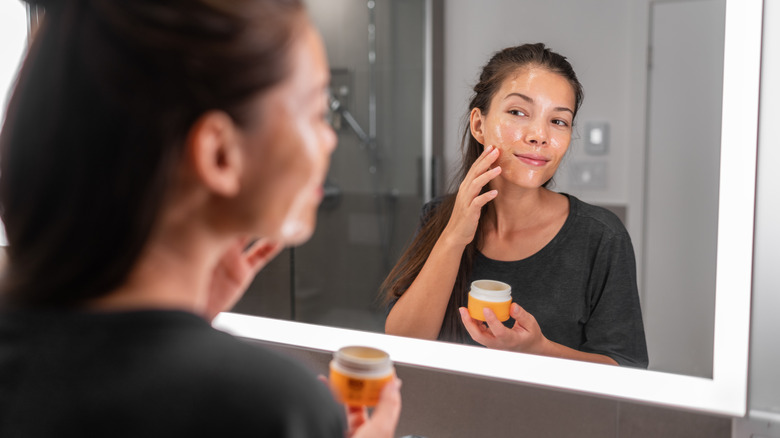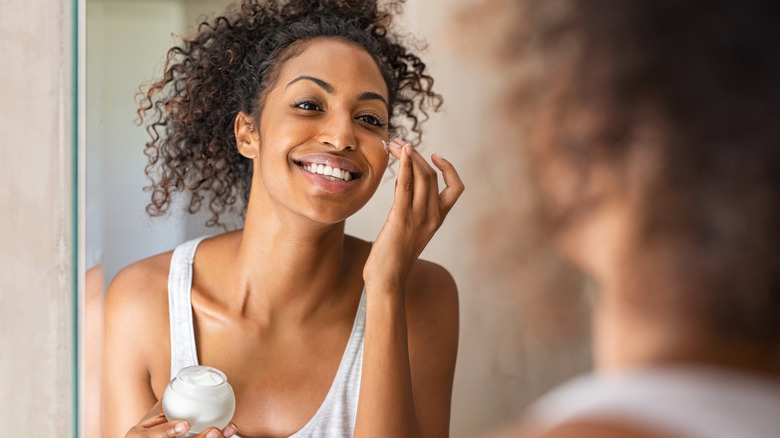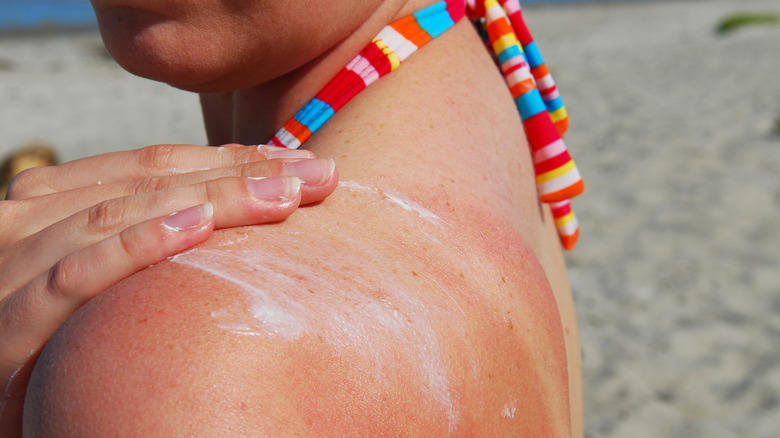Sun Damage Reversal Is Possible And It All Starts With Proper Skincare
Despite the fact that we already know the negative effects the sun can have on our skin, it doesn't stop some people from heading out into the world without proper SPF. Or, there are those who loved the look of being tan in their younger days, back when wrinkles and sunspots seemed like a lifetime away, and now they're staring in the mirror at the sun damage from those beautifully naïve beach days. (But they were glorious, weren't they?)
According to a 2013 study published in Clinical, Cosmetic and Investigational Dermatology, UV exposure is to blame for a whopping 80% of facial aging. With the sun being responsible for all this epidermal mayhem, luckily, "It is possible to reverse [sun damage] to some extent utilizing lasers, chemical peels, and certain topical medications to destroy dark spots and vessels, encourage collagen deposition and remove the damaged layers of skin," board-certified dermatologist Dr. Susan Bard told CNET. But don't expect miracles. "Once DNA mutation has occurred due to UV irradiation, there is no way to undo that," said Dr. Bard. "The cell needs to be destroyed by an outside modality or by the body."
Although you may never get back the skin you had prior to your sun-worshipping days, there is hope. The first step is never, ever leaving the house without SPF — and you need more sunscreen thanks to climate change. The second is giving your skin the proper care it needs.
Introduce antioxidants to your skin care routine
You've probably heard of antioxidants when it comes to food, like how red wine and green tea are a great source of them, but they can be used externally too. Antioxidants are molecules that essentially do all the dirty work for you by waging a war against free radicals. Free radicals are compounds that, when their levels increase, can do some major damage to the body, resulting in heart disease, diabetes, or even cancer. Because sun damage is often associated with cancer — skin cancer is the most common type of cancer in the world according to the World Health Organization — you want to make sure your face is getting a healthy dose of antioxidants.
"While [an antioxidant] is not classified as SPF, it does increase the skin's resistance to the sun by a little bit and is an excellent choice as a base layer before sunscreen," board-certified dermatologist Rebecca Marcus, M.D. told MindBodyGreen. Three antioxidants that you can easily infuse into your skincare routine are safflower seed oil, the combination of vitamins E and C, and Coenzyme Q10. The latter is an antioxidant the body already makes, but as we age, like a lot of things, its levels decrease. All of these will help in improving elasticity with their collagen components and ability to keep free radicals, for the most part, at bay.
Load up on the retinol
As a derivative of vitamin A, retinol is a major ally in helping to reverse sun damage. According to a 2019 study published in Advances in Dermatology and Allergology, retinol stimulates cellular activity that encourages cell regeneration and contains anti-aging and anti-wrinkle properties.
"It's the gold standard," dermatologist David Bank, M.D. told Skin Cancer Foundation. "It can help color, tone, and texture. It can even out pigmentation and help fade brown spots. It can make the skin smoother and softer, and even diminish fine lines and wrinkles." While you shouldn't expect miracles, retinol will help by decreasing the pigmentation that comes with sunspots and can help maintain your skin going forward.
However, if you're desperate to minimize your sunspots as much as humanly possible, lasering is an option. "This treatment turns on the healing and repair mechanisms in the skin, which basically put down fresh, healthy skin cells and collagen," said Dr. Bank. While effective, laser treatments will financially set you back far more than retinol and antioxidants. The best way to deal with sun damage? Sunscreen. Don't just put it on when you go to the beach, but wear it every day and be sure to put it on your hands too. If you do go to the beach, make sure you're protected from head to toe, including putting sunscreen on your scalp. If you can avoid or limit damage in the first place, then trying to reverse it will never be an issue.


